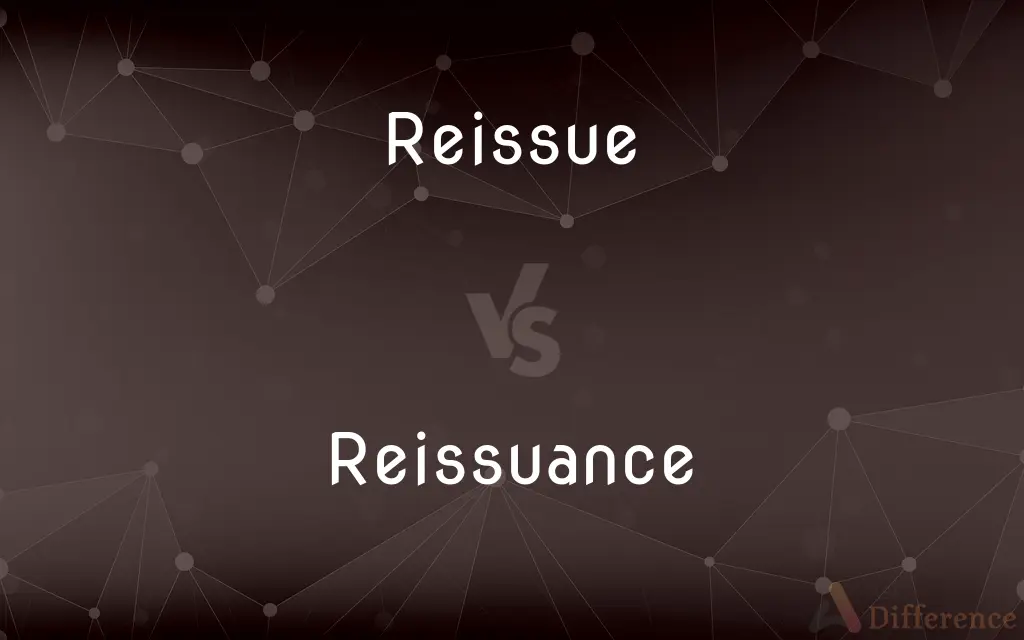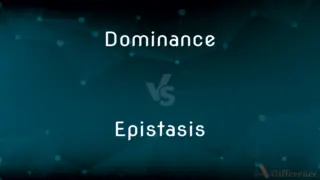Reissue vs. Reissuance — What's the Difference?
By Maham Liaqat & Urooj Arif — Updated on April 7, 2024
Reissue is the act of releasing again, especially in publishing and media. Reissuance pertains to official documents' renewal or replacement.

Difference Between Reissue and Reissuance
Table of Contents
ADVERTISEMENT
Key Differences
Reissue refers to the process of releasing previously issued items, such as books, albums, or stamps, often with additional content or in a new format, to meet continued demand or introduce these items to a new audience. Whereas reissuance is specifically related to the process of renewing, replacing, or issuing a new instance of an official document or financial instrument, like passports, licenses, or bonds, often due to expiration, loss, or changes in the information they contain.
While reissues are common in entertainment, publishing, and philately, where items may be re-released with updated features, remastering, or commemorative elements, reissuances are typically procedural and regulated, involving formal criteria and verification processes by issuing authorities, such as government agencies or financial institutions.
Reissue often aims at reviving interest, commemorating milestones, or making works available under improved conditions (e.g., enhanced audio or video quality, additional content), thus adding value or historical insight. On the other hand, reissuance serves a practical necessity, ensuring individuals or entities possess valid and current documents necessary for identification, legal, or financial activities.
The decision to reissue a product is usually market-driven, influenced by potential demand, cultural significance, or technological advancements. In contrast, reissuance is primarily demand-driven by the document holder's needs, subject to specific regulations and standards that must be met for the new document to be issued.
Despite their differences, both processes involve a form of replication or renewal, with reissues focusing on commercial or cultural products and reissuances dealing with the administrative renewal of official documents and instruments.
ADVERTISEMENT
Comparison Chart
Definition
Release of previously issued items in a new or updated form
Renewal or replacement of an official document
Typical Contexts
Publishing, music, and entertainment
Government and financial documents
Purpose
To meet continued demand, update content, or improve quality
To ensure validity and accuracy of official documents
Influences
Market demand, cultural significance, technological advancements
Legal requirements, document expiration, loss or change
Examples
Reissued classic novels, remastered albums
Renewed passports, reissued licenses
Compare with Definitions
Reissue
May involve remastering or updating.
The film was reissued in 4K resolution for its anniversary.
Reissuance
Involves verification processes.
Reissuance of the license required a new application and proof of identity.
Reissue
Aims to reach new audiences.
Classic video games are reissued for modern consoles.
Reissuance
Renewal or replacement of documents.
The reissuance of her passport was completed in two weeks.
Reissue
Can commemorate milestones.
The reissue of the stamp marks the centenary of the event.
Reissuance
Required due to expiration or loss.
Certificate reissuance is common after expiration.
Reissue
Often includes additional content.
The reissued album features two previously unreleased tracks.
Reissuance
Pertains to financial instruments too.
Bond reissuance may occur to adjust interest rates.
Reissue
Release of a previously available product.
The novel was reissued with a new foreword by a famous author.
Reissuance
Ensures current validity.
The reissuance of their credentials was necessary for legal compliance.
Reissue
In the music industry, a reissue (also re-release, repackage or re-edition) is the release of an album or single which has been released at least once before, sometimes with alterations or additions.
Reissuance
A second or subsequent issuance.
Reissue
To issue again, especially to make available again.
Reissue
To come forth again.
Reissue
A second or subsequent issue, as of a book.
Reissue
A reprinting of postage stamps from unchanged plates.
Reissue
To issue again.
Reissue
To reprint a series of postage stamps from old plates.
Reissue
In patent law: to permit a patent with ministerial errors to be corrected and enforced for the remainder of the original term of the patent.
Reissue
Something that has issued, or been issued again.
Copies of the original comic are valued by collectors, but the reissues are worthless.
Reissue
A second or subsequent printing of postage stamps from old plates.
Reissue
To issue a second time.
Reissue
A second or repeated issue.
Reissue
A publication (such as a book) that is reprinted without changes or editing and offered again for sale
Reissue
Print anew;
They never reprinted the famous treatise
Reissue
Issue (a new version of);
If you forget your password, it can be changed and reissued
Common Curiosities
How does a reissue benefit the original creators?
Reissues can provide financial benefits through new sales and enhance an artist's or author's legacy by bringing their work to new generations.
Is reissuance always initiated by the document holder?
While often initiated by the holder, reissuance can also be required by law or regulation changes, necessitating updated documentation.
Why are documents reissued?
Documents are reissued due to expiration, loss, damage, or changes in personal information, ensuring their continued validity and compliance with regulations.
How long does document reissuance take?
The time frame varies by document type and issuing authority but usually involves processing times that can range from a few days to several weeks.
What documentation is needed for reissuance?
The specific documentation varies but typically includes identification, proof of the original document's issuance, and, if applicable, evidence of changes necessitating the reissuance.
What triggers a reissue of a product?
A reissue is often triggered by continued demand, technological improvements, significant anniversaries, or the desire to introduce a product to new audiences.
Do reissues devalue original editions?
It depends on the context and the collector's market; in some cases, reissues can increase interest in original editions, while in others, they provide a more accessible alternative without significantly affecting the originals' value.
Can any product be reissued?
Technically, any product can be reissued if there's perceived demand and the rights to produce it are clear, though it's most common in media and entertainment.
Can a reissued product differ from the original?
Yes, reissued products often feature differences such as additional content, improved quality, or updated packaging to add value and appeal.
Is there a limit to how many times a document can be reissued?
There's no general limit, but certain documents may have restrictions based on validity periods or regulatory changes.
Share Your Discovery

Previous Comparison
Jazz vs. Blues
Next Comparison
Dominance vs. EpistasisAuthor Spotlight
Written by
Maham LiaqatCo-written by
Urooj ArifUrooj is a skilled content writer at Ask Difference, known for her exceptional ability to simplify complex topics into engaging and informative content. With a passion for research and a flair for clear, concise writing, she consistently delivers articles that resonate with our diverse audience.














































